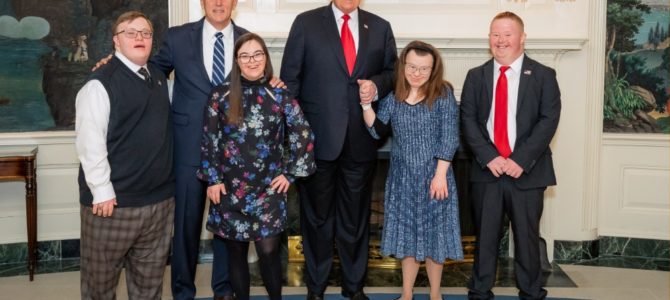
In an op-ed in The Washington Post from Sept. 27, Ruth Marcus writes that Judge Amy Coney Barrett “reportedly learned of her son’s Down syndrome through prenatal testing and chose to continue the pregnancy. She would, it appears, deny others the freedom to make a different decision, as two-thirds say they would.”
As someone who has a brother with Down syndrome, I can say that, yes, Down syndrome presents some exceedingly difficult challenges. Unlike many conditions, Down syndrome affects a person’s appearance and mental ability, as well as, in some cases, their physical health. It’s also true that very few parents would want their child to have Down syndrome. But it’s important to distinguish between not wanting a child to have Down syndrome and not wanting a child who has Down syndrome.
Those parents who do want their child with Down syndrome may well find that loving that child is an ennobling and transformative experience. Having a loved one with special needs does not impede success or happiness — as Judge Barrett herself has shown.
Jane Austen, Ralph Waldo Emerson, Thomas Jefferson, and Walt Whitman all had siblings with intellectual disabilities. The playwright Arthur Miller and his wife Inge Morath had a son with Down syndrome. Charles de Gaulle’s daughter had Down syndrome. The great baseball player Albert Pujols has a daughter who has Down syndrome. Actors Jamie Foxx and Eva Longoria each have siblings with Down syndrome.
I’m sure that each of these people handled their situations differently. It’s almost certainly true that if they could have removed their loved one’s disability, they would have. But is it not possible that having a loved one with special needs beneficially shaped each of their lives?
Early on in the novel “To Kill a Mockingbird,” we read that the main character, Scout, is frightened of her intellectually disabled neighbor, Boo Radley. The mere thought of going into his yard terrifies her. By the end of the book, however, after witnessing the injustice and hatred in the people around her, Scout stands confidently next to Boo on his front porch, literally viewing the world from his perspective.
Author Harper Lee shows the reader that the dramatic change in how Scout relates to this intellectually disabled man proves her personal growth. Her ability to overcome her fear of Boo and embrace him as a friend was proof of the wider ability to overcome other forms of prejudice and hate that threatened to enter her heart from the society around her.
A couple of years ago, in March 2018, Ruth Marcus wrote another op-ed in The Washington Post titled “I would’ve aborted a fetus with Down syndrome. Women need that right.” This statement expresses the feelings of many women, and it is important to acknowledge that. But there is an alternative view, which is that having a child with Down syndrome can be the best path for a person, especially for someone who believes that God makes all things work together for good. I think this is the view of life that Barrett has.
A scene from Virgil’s epic poem “The Aeneid” that beautifully expresses the power of accepting a loved one with a disability. The great Trojan hero, Aeneas, is seeking to flee Troy as the Greeks burn it down. Aeneas has a problem, though: his father, Anchises, is physically disabled and unable to walk. Anchises urges his son to leave without him, but Aeneas refuses:
Come then, dear father, mount upon my neck; I’ll bear you on my shoulders. That is not too much for me. Whatever waits for us, we both shall share one danger, one salvation.
This quote expresses a heroic vision of life that people in general need to have. It gets beyond all the selfish worrying over the future and boldly seeks to “share one danger, one salvation” with a disabled loved one.
This is not a view of the world that comes from thinking that having a child with Down syndrome destroys a person’s life. Rather, this perspective has a beauty and a power that come from embracing sacrifice and camaraderie on the journey towards salvation. By boldly asserting that caring for someone with Down syndrome or any other disability “is not too much for me,” it’s an empowering life-affirming vision.
Barrett knew that her son had Down syndrome before his birth, yet she chose to bear him anyway. This act, this choice, embodies such a noble view of life that it’s genuinely hard to understand how Marcus and others are repulsed by the thought of making the same choice.
Two of the greatest characters in literature, a young girl named Scout and a warrior named Aeneas, each had defining moments when they embraced people with disabilities. One virtue that is lacking in our culture is the belief that caring for a loved one with a disability is a wise and transformative thing to do.








